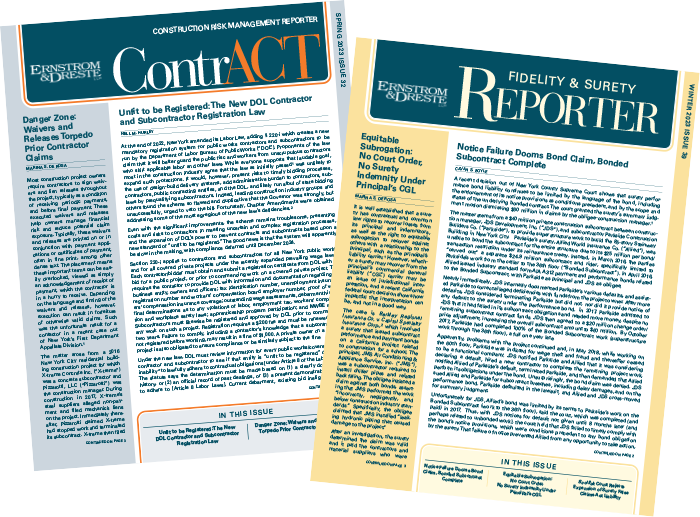Article by: Nell M. Hurley
All parties, including the sureties and the obligee in this declaratory judgment action, were likely surprised by the outcome of a recent New York federal district court decision. The obligee’s motion to dismiss the sureties’ complaint was denied, but not because the court found the underlying construction contract’s ADR provision inapplicable to the sureties. Instead, it found the contract language failed to qualify the term as a condition precedent to commencing litigation and thus was no barrier to the Sureties’ suit. The court decision1 upheld the assigned magistrate’s initial finding2 and the magistrate’s determination on the obligee’s motion for reconsideration.3
In 2020, the plaintiffs-sureties in the matter, Travelers Casualty and Surety Co. and Liberty Mutual Insurance Co. (the “Sureties”), issued a $41 million AIA A312 performance bond (“Bond”), and payment bonds, on an affordable housing project in Buffalo, N.Y. for which its principal was the general contractor. The obligees were the owner-developer and its financing company (together, “Silo City”). Problems arose, with Silo City ultimately terminating the contract, performing work and making a claim on the Bond. The Sureties denied the claim and immediately sought a declaratory judgment in federal district court that it was exonerated by virtue of Silo City’s prior breach and/or failure to comply with the Bond’s notice provisions, which thus precluded Silo City’s Bond claim.4
Silo City moved to dismiss the Sureties’ complaint based upon a provision in the construction contract that it claimed required that the Sureties mediate prior to suit. The provision stated:
Claims, disputes, or other matters in controversy arising out of or related to the Contract… shall be subject to mediation as a condition precedent to binding dispute resolution.
Because the bond incorporates the construction contract by reference, Silo City argued, the Sureties were required to mediate prior to filing the lawsuit. Since they had not done so, the Sureties’ declaratory judgment action must be dismissed, Silo City said.
The Sureties maintained that the Bond’s incorporation of the construction contract by reference does not apply to the contract’s dispute resolution provisions for claims relating specifically to the performance bond, that the Bond permits litigation without condition and that, at most, the action should be stayed while mediation takes place, rather than dismissed.
The assigned magistrate reviewed the language of the contract’s dispute resolution provisions and concluded that it need not even reach the Sureties’ arguments, because:
“[the language] does not make mediation a condition precedent to commencing litigation – instead it makes mediation a condition only to “binding dispute resolution.”
Reasoning that to “resolve” a dispute means to make a formal decision, and that commencement of litigation does not formally decide anything, the magistrate determined that “the mediation requirement is not a condition precedent to the right to sue.”
The magistrate granted Silo City’s motion for reconsideration, but adhered to the initial recommendation, pointing out that the language at issue differed from cases holding such clauses to be conditions precedent, including the absence of such language as “prior to” and “as a condition of” commencing an action or other binding dispute resolution proceeding. Other general conditions of the contract at issue, he noted, expressly permit the request for mediation to be made concurrently with filing of binding dispute resolution proceedings (rather than prior to) and allows the parties to engage in mediation even during litigation. Thus the magistrate concluded:
“[t]he only clear condition precedent is contained in [a different provision], making mediation a “condition precedent to binding dispute resolution”, rather than to binding dispute resolution proceedings such as the commencement of litigation.”
After further objections by Silo City, the district court reviewed the matter de novo, but accepted the magistrate’s recommendation, denying Silo City’s motion to dismiss the Sureties’ action.
Many surety and construction professionals might assume that the language at issue here creates a condition precedent to initiating litigation, with the larger question being whether it applied to the Sureties for performance bond-specific issues. The court’s interpretation, however, shows that the New York standard for conditions precedent that the language be “unmistakably clear” remains an exceedingly strict one, and is still subject to interpretation. While the litigation between the parties continues in both state and federal court, with more motion practice likely, this result was a welcome, if unexpected, boost for the Sureties.
- Travelers Cas. & Sur. Co. v. Silo City Phase I, LLC, 2023 WL 2815729 (W.D.N.Y. Apr. 5, 2023).
- 2023 WL 19335887 (W.D.N.Y. Dec. 27, 2022).
- 2023 WL 2848709 (W.D.N.Y. Feb 17, 2023).
- Five weeks after the federal action was commenced, Silo City sought mediation and brought a state court action against the contractor and the Sureties in Erie County Supreme Court.



